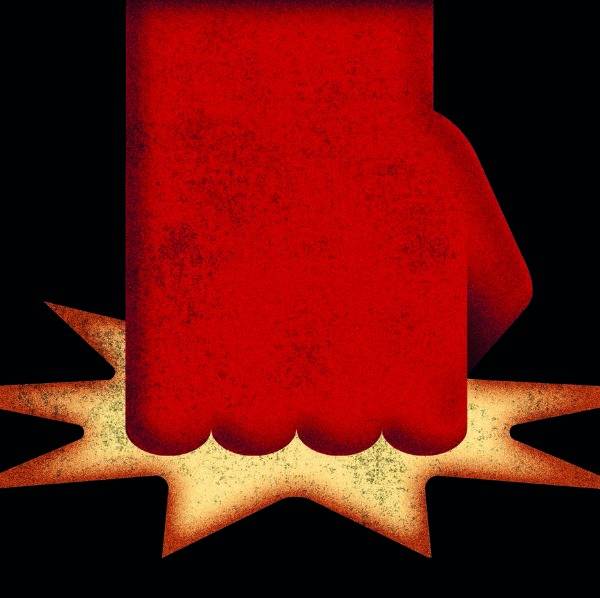If the Conservatives win 37.5 per cent of the vote in the coming general election - a figure they have not reached since Black Wednesday - and Labour, dipping to a low not seen since 1992, gets the same figure, Labour will still have 140 more seats than the Tories. Smaller Labour seats, the party's overrepresentation in Scotland and Wales and tactical voting by Labour and Liberal Democrats mean that to win a majority of just one seat, the Conservatives would need a lead of 11.5 per cent last seen in the months after their 1987 election victory. Michael Howard seems doomed to failure and likely resignation. Within six months Tony Blair may have seen off his fourth Tory leader since he became Prime Minister.
What is clear is that the Conservatives need to move towards the centre to claim as many voters as they can. The difficulty is that Blair is sitting squarely on centre ground. And as Kieron O'Hara points out in his masterly study of the Conservative dilemma, shifting him is going to be extraordinarily difficult if the party does not agree either on its tactics, its ideology or even on its rich historical heritage. The cliché headlines 'Howard's Way' will fairly soon give way to another cliché 'Howard's End'.
If another defeat does not bring about the party's disintegration (and there is no reason that it should; Labour, after all, suffered 18 years in the wilderness and was virtually written off under Michael Foot), it will, at least, cause a fundamental and ferocious reassessment of what the party stands for and what should be its message. The groundwork, however, has already been laid by O'Hara's confusingly titled book After Blair. Part philosophy, part history and part psephology, his analysis is a penetrating investigation into what is conservatism (with a small 'c'), what has traditionally motivated Conservatives (with a capital 'c') and what dilemmas are involved adjusting old and settled beliefs to a bewildering, changing social reality.
He looks at how the categories 'left' and 'right' have lost their relevance, at how the attempt to plunder the past for guidance is no longer easy when some of the old compromises between pragmatism and belief are no longer able to withstand the assault by the New Right (much of it imported from America), and at how the Thatcher legacy has made it very difficult for Tories to break out of the Tebbit trinity of Europe, immigration and tax. "Tory policymaking has tended to equivocate between 'back to the days of Thatcher' and 'let's copy Blair in elevating style over content'." He insists that not all Conservatives are conservative, and that conservatism is not necessarily an ideology shared by all Conservatives. Indeed, in a breakdown of recent leadership contests, he concludes that neither Michael Portillo nor Kenneth Clarke subscribe to the fundamentals of conservatism.
What are those fundamentals? In a useful historical survey, O'Hara goes right back to the Greeks, in particular Pyrrho and his disciple Sextus Empiricus, and shows how the idea of resignation to the imperfectability of man and the acceptance of limitations is a vital strand in conservatism. Dealing with the world as it is, and scepticism of all utopian absolutism resurfaces again and again in political thinking, especially in the works of Thomas Browne and Montaigne. The result was often inconsistent, but it was infused with common sense: "The sceptical conservatism I am describing has its roots in tolerance and the avoidance of extremes."
Historical circumstances also played a vital role in shaping the Conservative party, especially the great schism under Peel over the Corn Laws. But O'Hara notes that, by and large, Conservatives are happy with the status quo and find much of their ideological content determined by the radical plans of the opposition. This tended to encourage an antiintellectualism. Indeed, in the 19th century, Conservatives were almost proud of being the 'stupid' party, and Lord Salisbury, one of its most static and unimaginative leaders, tried to make a virtue of letting things be.
But the Conservatives have never been able to rely on blanket opposition to all change: Disraeli, famously, wanted to broaden the party's base with an alliance with the working class. And most Conservatives understood that to argue for the rights of privilege and entrenched rights would cut no ice with voters if it was done purely on a selfish basis. The danger is that by the start of this century the 'stupid' party had become Theresa May's 'nasty' party.
O'Hara also ruthlessly analyses dilemmas thrown up by modern conditions. The libertarian argument, for example (much influenced by Edmund Burke, a Whig), is a votewinning response to government 'meddling' and attempts to reengineer society by 'old' and 'new' Labour.
But what of such issues today as homosexuality and drugs? How do Conservatives' dislike of these square with the emphasis on personal freedoms? And how can Mrs Thatcher's notorious dismissal of 'society' be reconciled with the realities of an interdependent world? (She spent much time subsequently claiming that she was really referring to an overpowerful state, not society).
This is a brainy and, at times, dense book. It is a challenging attempt to define what is often indefinable. But it does not really answer the question how Michael Howard can win an election. Nor does it give us any idea of what will come 'after Blair'.
After Blair is available from Amazon (UK)

